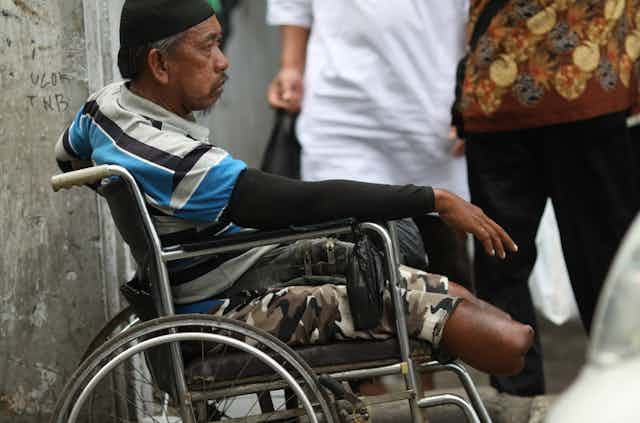This article is part of a series to mark the International Day of Persons with Disabilities on Dec. 3
In 2018, Romi Syofpa Ismael, a contract dentist in South Solok, West Sumatra, was refused a job in the public service because she was in a wheelchair.
The district government argued she did not pass physical examinations due to her disability. Romi’s story occurred two years after Indonesia passed a new national disability law.
A result of years of campaigning and negotiation by Indonesia’s vibrant disability movement, the law is based on the United Nations Convention on the Rights of Persons with Disabilities (CRPD). The convention acknowledges that people with disabilities share the same rights as all other people.
Many have lauded the law as a step forward in challenging attitudes to people with disability. Society still considers having a disability as something to be ashamed of or pitied. The previous 1997 law describes people with a disability as needing welfare and charity.
Romi’s story proves that people in power are still reluctant to embrace a new approach to disability using a human rights perspective.
Our 2018 research into what happened after the law was passed has demonstrated similar reluctance among local policymakers.
Our findings suggests this reluctance is due to a lack of political incentives for policymakers to implement the law. It’s still difficult to enforce the law as it requires decisions that could be expensive and requires government departments and service providers to do things differently.
Therefore, it is important to provide disability activists with skills, confidence and networks to continue campaigning for the law to be fully implemented.
Challenging deeply held views takes time
The new disability law considers people with disabilities as people who are capable of making a meaningful contribution to society. But changing Indonesian people’s mindset on disability is not an easy feat.
Our research with ten disability activists as well as a group of three activists from organisations in Sumatra, Java and Sulawesi showed local officials continue to believe that a person with a disability does not possess the required “physical and mental fitness” and can not get a position in government offices.
The South Solok story is a strong example.
This indicates that the paradigm shift outlined in the national law has not been embraced in the day-to-day decisions of policymakers.
Multisectoral efforts
Throughout Indonesia’s history, disability issues have been within the domain of the Ministry of Social Affairs. The ministry has been responsible for providing rehabilitation services and social protection programs for people with disabilities.
But disability is a multisectoral issue. The new law encourages the government to treat disability as such.
After the law was passed, disability activists identified ten ministries that could implement different parts of the law. But the government was slow to adopt these suggestions.
Then, in early October, the government passed a regulation that will contribute to the law becoming more multisectoral. The regulation specifies the responsibilities of each ministry and local governments to work across sectors.
However, it will likely take decades before this regulation is completely implemented.
The absence of a broader culture of seeing people with disabilities as having rights rather than needs and the fact that it is not a priority issue for the government are two major reasons change has been so slow.
Calling out discrimination
Disability activists continue to hold an important role following their success in campaigning for the new disability law in Indonesia.
Our interviews with disability activists showed a rights-based approach to disability will take time to take root in Indonesia.
In our research, we spoke to activists who were trying to negotiate with local government officials who were not even aware Indonesia had a new disability law.
In the case of the dentist in South Solok, activists from several national and local disability organisations, as well as the local legal aid organisation and a number of women’s groups, defended her position.
A group of disability activists in the province’s capital, Padang, also protested against the district government’s decision.
The dentist herself has been travelling around the country to raise awareness of her situation. She went to the capital, Jakarta, to share how the treatment of her violates the government’s commitments to uphold the rights of people with disabilities.
In the end, the dentist and her supporters succeeded. The South Solok district government decided to appoint Romi as a public servant.
However, disability rights activists around Indonesia are not all as well resourced or skilled as the activists defending Romi.
The level of knowledge of the government officials they are trying to engage also varies widely.
This points to the need for ongoing capacity-building programs for disability activists around Indonesia as they campaign for the rights of people with disabilities.


